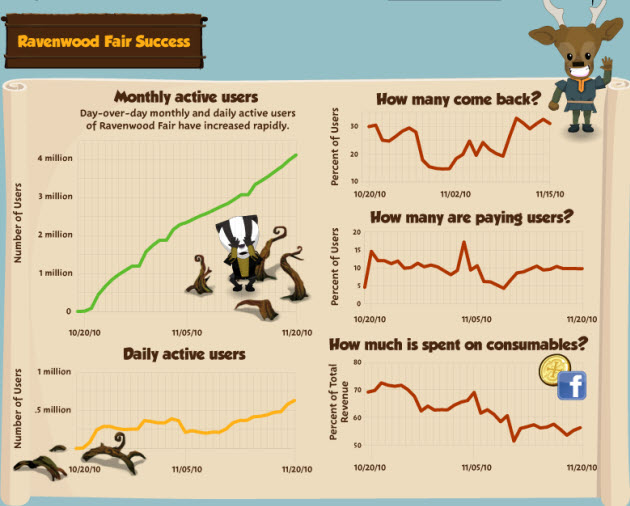LOLapps游戏Ravenwood Fair业绩优于社交游戏平均值
在众多Facebook应用开发商中,最近社交游戏开发公司LOLapps公布了其10月19日发布的社交游戏Ravenwood Fair取得的良好成绩。
据AppData数据显示,Ravenwood Fair在发布6周后月活跃用户攀升至440万。在最近的社交游戏峰会上,LOLappps的首席执行官Arjun Sethi表示部分Ravenwood Fair玩家已经转化为付费玩家。如下图表可见,Ravenwood Fair中大于10%的用户愿意在游戏中进行消费,其中50%到75%的消费主要集中为诸如额外能量等可以反复购买的游戏道具。
Ravenwood Fair的以上数据在众多社交游戏之中可谓是出类拔萃。Facebook游戏都是免费游戏,玩家可以免费进行游戏后再根据自己的需要购买虚拟商品,如FarmVille玩家如果需要拖拉机燃料就可以选择用真实货币购买。然而一般而言,玩家中仅有3%到5%为付费玩家,而且随着时间的推移,付费玩家的购物频率也会愈趋愈缓。但就上述的Ravenwood Fair表现而言,它明显优于大部分的社交游戏。
在Ravenwood Fair中,玩家化身为森林中的可爱小动物,游戏的目的就是要伐木建造一个安全整洁的环境,吸引更多可爱小动物来访。然而森林十分令人毛骨悚然,玩家必须不断地击退来自森林和野兽的威胁。
在经历Facebook惩治政策之后,大于30%的玩家现回归该款游戏。在Ravenwood Fair目前的用户结构中,62%为女性,且主要集中在18到24岁的年龄层。而在Facebook社交网站中56%的用户为女性,其中60%的社交游戏玩家也是女性。而从地域上看,Ravenwood Fair的玩家最主要来自于美国,其后是菲律宾,英国和法国。最常用的语言是英语和西班牙语。
总部位于美国旧金山的LoLapps社交游戏公司凭借旗下的赠礼和测验应用在Facebook社交网站拥有将近1亿月活跃用户。今年,该公司加大了对社交游戏的投入,而今年发布的Ravenwood Fair正是由公司顾问John Romero(同时是Doom的合作开发者)开发制作的社交游戏。在访问中,Romero表示自己将开发的重点侧重于吸引玩家。这也正是LOLapp公司社交游戏发展策略的组成部分之一。LOLapps希望能凭借社交游戏,跻身Zynga ,EA-Playfish,迪士尼-Playdom之列和CrowdStar等主流社交游戏开发公司之列。目前,LOLapps也通过开发简单的休闲游戏以刺激玩家购买虚拟商品实现盈利。
其实,在发布之初Ravenwood Fair便麻烦不断。Ravenwood Fair本预计在10月15日正式发布,然而当天LOLapps的全部游戏却刚好被Facebook集体禁用直到17日晚间才恢复运营,对此Facebook提出的理由是“违背Facebook社交网站政策”。此后,华尔街日报报导包括LOLapps在内的多家社交游戏公司将用户数据违例外传给第三方公司。LOLapps作为被披露的公司之一受到了Facebook的关闭病毒式传播渠道惩罚。为此,LOLapps与Facebook密切磋商,并承诺将保护用户的数据安全和遵守Facebook政策。到10月19日,LOLapps旗下的Ravenwood Fair再次回复运营。另外,LOLapps公司还发布了RavenwoodFair.com网站,以促进游戏平台的多样化。(本文为游戏邦/gamerboom.com编译,转载请注明来源:游戏邦)
In a useful case study for Facebook developers, LOLapps is unveiling the stellar results it has gotten with Ravenwood Fair, a social game launched on Facebook on October 19.
In six weeks, the game has grown to 4.4 million users, according to AppData. And in a talk at the Social Gaming Summit East, LOLapps chief executive Arjun Sethi says that those players are also spending money. As you can see in the charts above, more than 10 percent of users are spending money in the game. And anywhere from 50 to 75 percent of that money is spent on consumables, or items such as extra energy that can be bought over and over again.
For social games, those are good numbers. Facebook games are free-to-play, where users can play for free and pay as they go. They pay real money for virtual goods, such as tractor fuel in Zynga’s FarmVille. But only 3 to 5 percent of users typically pay, and the amount of users buying goods tends to decline over time. With Ravenwood Fair, LOLapps is clearly tracking well above that.
In the game, users find themselves as a cute animal in a forest. The goal is to chop down trees and build a fair in the clearing and attract more cute animal visitors. But the forest is creepy and you have to constantly battle back the trees and monsters that try to scare your visitors.
More than 30 percent of users are coming back. About 62 percent of the players are women and the largest age group is 18 to 24. On Facebook itself, 56 percent of the users are women and 60 percent of the players are women. As far as the origin, the country that has the most Ravenwood Fair players is the U.S., followed by the Philippines, the United Kingdom, and France. English is the No. 1 language, followed by Spanish.
As we’ve noted in past stories, San Francisco-based LOLapps has about 100 million monthly active users on Facebook, mostly for its gift and quiz apps. This year, the company stepped up its investment in social games. Ravenwood Fair was developed by consultant John Romero, co-creator of Doom. In an interview, Romero said he put more emphasis on keeping users engaged so they would play for longer sessions and keep coming back. The effort is part of LOLapps’ strategy to become a big player in social games and join the ranks of Zynga, EA-Playfish, Disney-Playdom, and CrowdStar. Those companies have been printing money by creating simple casual games that entice users to buy virtual goods.
Ravenwood Fair was almost derailed. It was supposed to launch on Oct. 15, but Facebook pulled down all LOLapps games on that day and didn’t restore them until the evening of 17, citing only “violation of Facebook’s policies.” The Wall Street Journal reported that some games, including LOLapps titles, were wrongfully transmitting user data to third-party companies. Of those companies, LOLapps was one that was singled out and shut down. Sethi said LOLapps worked with Facebook to restore its games and will ensure it can protect users’ safety and abide by Facebook’s policies. By Tuesday, Oct. 19, LOLapps was able to launch Ravenwood Fair on Facebook. The company has pretty much put that problem behind it, but it also launched its own RavenwoodFair.com web site game, as part of a move to diversify away from Facebook. (Source:venturebeat)









































 闽公网安备35020302001549号
闽公网安备35020302001549号